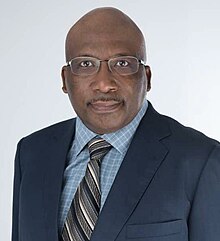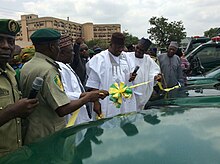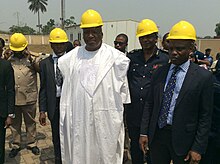Abdulrahman Dambazau
Prof, Abdulrahman Dambazau | |
|---|---|
 | |
| Minister of the Interior | |
| In office November 2015 – May 2019 | |
| President | Muhammadu Buhari |
| Preceded by | Patrick Abba Moro |
| Succeeded by | Rauf Aregbesola |
| Chief of Army Staff | |
| In office August 2008 – September 2010 | |
| President | Umaru Yar'Adua |
| Preceded by | Luka Yusuf |
| Succeeded by | Azubuike Ihejirika |
| Personal details | |
| Born | 14 March 1954 Zaria, Northern Region, British Nigeria (now in Kaduna State, Nigeria) |
| Alma mater | |
| Military service | |
| Allegiance | |
| Branch/service | |
| Years of service | 1977–2010 |
| Rank | |
Abdulrahman Bello Dambazau CFR GSS, psc, ndc, fwc(+) (born 14 March 1954) is a retired Nigerian army general and politician who served as Chief of Army Staff from 2008 to 2010 and in President Muhammadu Buhari's Cabinet as Minister of the Interior from 2015 to 2019.
Early life
[edit]Family
[edit]Dambazau was born into a traditional military family of the Fulani Dambazawa clan. His father served in the Colonial Army, and his brothers held senior posts in the army. He also holds the traditional title of Baraden Kano.[1]
Education
[edit]Dambazau's secondary education took place at Barewa College, Zaria, where he graduated in 1974. Later in 1974, he proceeded to the Nigerian Defence Academy as a member of the 17 Regular Combatant Course. He was commissioned as a second lieutenant into the Infantry Corps of the Nigerian Army in June 1977.
In 1979, Dambazau attended the US Army Military Police School at Fort McClellan. Dambazau later obtained a bachelor's degree in criminal justice from Kent State University in 1982 and a PhD in criminology from the University of Keele in 1989.[2]
Military career
[edit]Command
[edit]Dambazau served as a military police officer, aide-de-camp to the Chief of Army Staff (1979), commanded military police units and served as a special investigator (1984-1985). Dambazau was registrar of the Nigerian Defence Academy from 1993 to 1999. He also served as chief instructor, Support Weapon Wing of the Infantry Centre and School from 1999 to 2001 and later as directing staff at the National War College from 2004 to 2006. From 2007 to 2008, he served as general officer commanding (GOC) 2nd Division, Ibadan.[3]
Chief of Army Staff
[edit]He was appointed Chief of Army Staff in 2008 by President Umaru Yar'Adua.[4] Towards the end of the Yar'Adua administration,[5][6] the army was accused of attempts to covertly seize power due to Yar'Adua's illness.[7] After Yar'Adua's death, Dambazau was retired from service by President Goodluck Jonathan.[8]
Major achievements as Chief of Army Staff
[edit]1. Nigerian Army Wide Area Network Infrastructure (NAWANI) in 2010.
2. Reconstruction of 44 Army Reference Hospital and upgrade to a Level 4 UN Hospital.
3. Built YarAdua Barracks by Direct Labour using Army Engineers.
4. Expanded the Army Peacekeeping Centre to have capacity to train two battalions simultaneously and got UN recognition as a regional training centre.
Revised all Nigerian Army Training Manuals.
Laid the foundation of the Counter Terrorism and Counter Insurgency Training Centre Jaji.
Achievements as Minister of Interior
[edit]1. Carried our reforms of the 4 agencies under the Ministry, creating seamless process of career progression, especially for training, appointments and promotions.[9]
2. Introduced biometrics and digitalized the international passport, including advance Travellers information in partnership with the INTERPOL.[10]
3. He redesign the prison system to reduce the population of awaiting trials inmates, by ensuring that they have their days in court without necessary delays due to poor logistics. Procured a lot of vehicles, built 3000-capacity correctional centers, and also ensure that the new Correctional Act was signed into law to refocus the objective of the prison from punishment to treatment and rehabilitation in line with UN Standards (the Mandela Rule).[11]

4. He created a SITUATION ROOM for the coordination of the activities of all security and public safety agencies, especially in response to emergencies.
5. He led the US-NIGERIA Security Sector Initiatives for the reforms of the security sector in response to emergencies, defence procurements, and activities in the northeast.
6. He developed the idea of establishing the INSTITUTE OF DOMESTIC SECUTITY for the strategic training of senior officers in the security agencies.
7. He proposed the idea of production of passports in Nigeria rather than overseas to make passports cheaper for Nigerians and also protect the database.
8. He started the Ministry of Interior Games in every two years, and conducted twice before he the Ministry. The idea was to create a platform to enhance the cooperation, coordination, and collaboration of the agencies.
9. He revived the Federal Fire Service, from only one old fire truck in its inventory to more than 40 new fire trucks, many water tankers. Also established six Zonal Fire HQs, in addition to reactivating the Fire Training School well equipped.

10. He created the AGRO RANGERS in the Civil Defence Corps for the protection of agricultural investments for individuals, groups and institutions against attacks from bandits and other criminals.
11. He initiated a High Level regional conference in partnership with ECOWAS COMMISSION for the implementation of the ECOWAS PROTOCOL ON TRANSHUMANCE to checkmate and monitor the movements of transhumance across borders.[12]
12. He designed strategy in partnership with the EU on irregular migration of Nigerians to Europe taking advantage of the well funded EU program on reverse migration for the training of stranded Nigerians in useful skills, especially the victims of human trafficking.
13. Integrated the main Ministry of Interior with the Agencies as part of the reforms to enable the civil servants be in tune with the operations of the Agencies.
14. He built a befitting office for the Minister, even he did not occupy it before he left, and the same time gave the old structure of building in the Ministry a face lift and refurbished.
15. He initiated the resettlement of Nigerian refugees in Cameroon, who were displaced by Boko Haram insurgency. He did that in partnership with Ministry of Foreign Affairs and the Cameroonian government.[13]
Political career
[edit]Following his retirement in 2010, Dambazau went into politics, later joining the All Progressives Congress (APC). During the 2015 presidential election, he was the head of the security committee of the APC campaign organisation, .[14]
Books
[edit]- Criminology and Criminal Justice 1999.
- Military Law Terminologies 1991.
- Policing and Terrorism challenges and issues in intelligence 2004.
Honors and awards
[edit]1.Commander of the Order of the Federal Republic (CFR).
2. National productivity Order of merit.
3. Distinguished Service Star.
4.A 2018 Hall of Fame Awardee of the College of education.
5. Health and Human service award by Kent state university Ohio USA.
6. Awarded the colonel pyar Lal memorial Gold medal for the best thesis at the National Defence College New Delhi India.
7. Ankrah Hall distinguished award at the Ghana Armed Forces Staff College.
Personal life
[edit]Abdulrahman Bello Danbazau is married with children. His hobbies include listening to music, watching documentaries, playing golf and conducting scholarly research. He holds the traditional title of Barden Kano.
See also
[edit]References
[edit]- ^ "Kano Emir confers traditional titles on Dambazau, others". Vanguard News. 11 May 2018. Retrieved 28 April 2020.
- ^ Eterno & Das (2010). Police Practices in Global Perspective. Rowman & Littlefield, 2010. p. 259. ISBN 9781442200241.
- ^ Adefaye, Gbenga. "Dambazau: What the army thinks". Vanguard Nigeria. Retrieved 12 July 2015.
- ^ Siollun, Max (25 August 2008). "Profile of Nigeria's New Military Service Chiefs". Max Siollun's Website. Retrieved 12 July 2015.
- ^ "UPDATED: The Turai Coup D'etat: How Turai Yar'Adua seized power". Sahara Reporters. 23 February 2010. Retrieved 28 April 2020.
- ^ "Dambazau: What the army thinks". Vanguard News. 13 March 2010. Retrieved 28 April 2020.
- ^ da Costa, Gilbert (31 January 2010). "Nigerians Wonder: Could a Military Coup Help Us?". Time. Archived from the original on 14 August 2014.
- ^ "How Dambazzau got news of his removal". The newafricanpress. 10 September 2010. Retrieved 28 April 2020.
- ^ "We have turned ministry of interior around in 4 years dambazau". Daily trust. 28 May 2019. Retrieved 28 May 2019.
- ^ "Nigeria introduces biometric visa stop unwanted visitors". Inside business Nigeria. 19 September 2019. Retrieved 19 September 2019.
- ^ "prison congestion port-harcourt prison accommodates 4204 inmates dambazau". Global patriot news. 10 March 2018. Retrieved 10 March 2018.
- ^ "ecowas security ministers to work with Nigeria and other members states to tackle regional security". old22.ecowas. 17 May 2019. Retrieved 17 May 2019.
- ^ Concord News.com/nigeria-to-commence-repatriation-of-refugees-from-cameroon/ "Nigeria to commence repatriation of refugees from Cameroon". Cameroon Concord News. 31 January 2019. Retrieved 31 January 2019.
{{cite web}}: Check|url=value (help) - ^ "Exclusive: How Dambazau lost out in NSA race". TheCable. 14 July 2015. Retrieved 28 April 2020.
- Dambazawa family
- 1954 births
- Chiefs of Army Staff (Nigeria)
- Nigerian generals
- Nigerian Defence Academy alumni
- Barewa College alumni
- Nigerian military police officers
- Kent State University alumni
- Alumni of Keele University
- Living people
- People from Zaria
- Federal ministers of Nigeria
- Interior ministers of Nigeria
- National Defence College, India alumni
